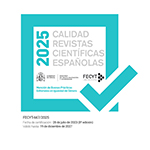Recuperación de las muestras en estudios longitudinales con adolescentes a través de las redes sociales: el estudio ILSEG
Resumen
Los estudios longitudinales de “panel” en los que se trata de seguir los cambios que se producen en el tiempo en una determinada población siguiendo a una misma muestra de esa población en distintos momentos de su vida, tropiezan con una especial dificultad: la de ir perdiendo en cada nueva fase de seguimiento un gran número de los sujetos que componían la muestra inicial.
El artículo que sigue examina esta situación en relación con los estudios longitudinales dirigidos a adolescentes y jóvenes mostrando el modo original de enfrentarse con ella que adoptó el estudio ILSEG (Investigación Longitudinal sobre la Segunda Generación) recurriendo a las posibilidades ofrecidas por las redes sociales Facebook y Tuenti. Trata pues los aspectos teóricos, metodológicos y prácticos de las posibilidades que ofrece internet para localizar y contactar a informantes conocidos. De hecho, sin el auxilio de las redes sociales de Internet, ILSEG no habría podido localizar sino al 44% de su muestra inicial de hijos de inmigrantes. Tras el recurso a internet se pudo llegar a localizar y a encuestar a un 73%: una cifra ampliamente satisfactoria en esta clase de estudios.
Descargas
Descarga artículo
Licencia
La revista Sociedad e Infancias, para fomentar el intercambio global del conocimiento, facilita el acceso sin restricciones a sus contenidos desde el momento de su publicación en la presente edición electrónica, y por eso es una revista de acceso abierto. Los originales publicados en esta revista son propiedad de la Universidad Complutense de Madrid y es obligatorio citar su procedencia en cualquier reproducción total o parcial. Todos los contenidos se distribuyen bajo una licencia de uso y distribución Creative Commons Reconocimiento 4.0 (CC BY 4.0). Esta circunstancia ha de hacerse constar expresamente de esta forma cuando sea necesario. Puede consultar la versión informativa y el texto legal de la licencia.










